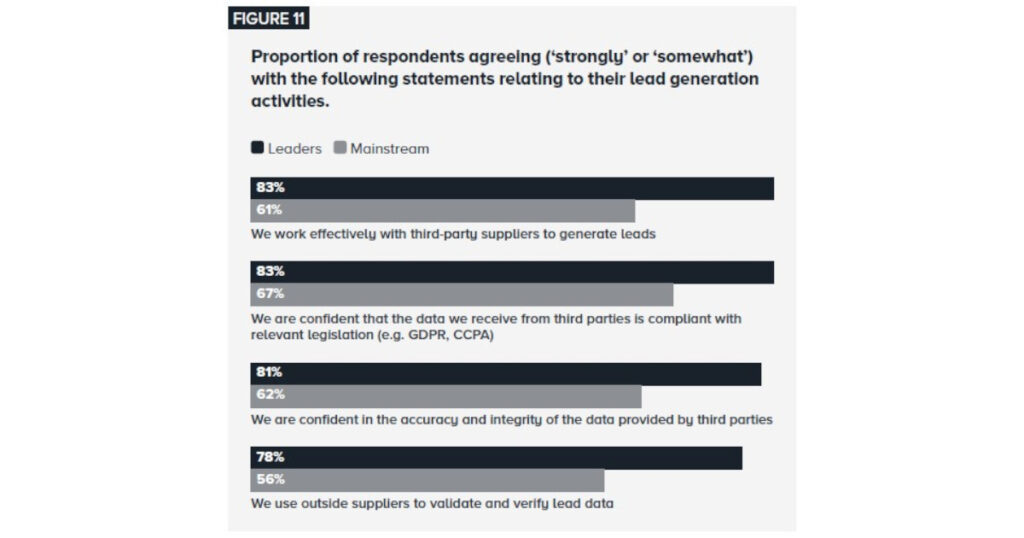B2B Lead Generation

Data Validation: The Hidden Price of Poor-Quality Lead Data
No matter what area of digital marketing you specialize in – data reigns supreme. It helps us better understand customers, optimize campaigns, and measure the ROI of our marketing efforts.
For most B2B businesses, lead data has replaced salespeople’s little black books of contacts, with data that marketers use to power marketing automation systems, helping them identify and nurture prospective clients.
However, the quality of this data can make or break a business’s success. Enter the unsung hero of the digital age: data validation.
What is Poor Quality Lead Data?
At its core, poor-quality lead data can be described as data that doesn’t accurately represent a potential customer or business partner.
This might manifest in several ways:
- Inaccurate or outdated contact information.
- Duplicate entries that muddy the waters of data analysis.
- Incomplete Records, missing crucial details.
- Leads that are irrelevant to the business or its goals.

The Tangible and Intangible Costs of Poor-Quality Lead Data
Tangible Costs
Wasted Marketing Spend: A 2022 study by Experian discovered that 94% of marketers reported losing revenue due to poor data quality, translating to an average loss of 12% of revenue.
Furthermore, the 2021 DemandGen Report highlighted that 61% of marketers reported squandering at least 25% of their marketing budget on ill-suited leads.
Sales Team Inefficiency: Navigating through poor-quality leads consumes a significant portion of a sales rep’s time. Sales Hacker’s 2023 research found that sales representatives expend an average of 25% of their time on data entry and tasks related to lead qualification.
Furthermore, a 2022 HubSpot study emphasized that 60% of sales representatives spent more time chasing fruitless leads than closing genuine deals.
Resource Misallocation: The financial ramifications of low-quality data are staggering. Gartner’s 2021 research indicated that organizations bleed an average of $15 million annually due to data inefficiencies.
Moreover, in 2022, IBM estimated the global cost of poor data quality to be an astonishing $3.1 trillion yearly.
Missed Opportunities: Opportunities lost to data inaccuracies can be detrimental to revenue. A 2023 study by Dun & Bradstreet estimated businesses forfeit an average of 12% of income due to these missed opportunities.
In comparison, the 2022 research by Aberdeen Group accentuated that businesses with pristine data are five times more primed to meet their revenue targets than those grappling with dirty data.
Intangible Costs
Brand Reputation: The digital era grants consumers the power to voice their displeasure swiftly. Sprout Social’s 2023 findings revealed that 75% of consumers would likely distance themselves from a brand on social media after receiving irrelevant or undesired marketing communications.
Nielsen’s 2022 study drove this by stating that 57% of consumers would hesitate to endorse a brand following an unfavorable marketing experience.
Employee Morale: Data quality directly impacts workplace motivation. A 2023 Glassdoor study showed that 73% of employees felt more invigorated with access to top-tier data.
Yet, a contrasting 2022 Gallup study noted that a mere 36% of US employees felt genuinely engaged at work.
Decision-making Inefficiencies: Making data-backed decisions is a surefire way to outpace competitors. McKinsey & Company’s 2023 research showcased that data-driven enterprises are 13 times more likely to eclipse their rivals.
However, a 2022 Forrester study offered a word of caution, with 63% of business leaders citing poor data quality as a significant hindrance to decision-making.
Loss of Competitive Advantage: Businesses that harness this asset set themselves apart in a world where data is power. Salesforce’s 2023 research illuminated that 79% of businesses regard data as a pivotal asset in maintaining a competitive edge.
Correspondingly, a 2022 IDC study highlighted that 53% of enterprises are bolstering their investments in data analytics to fortify their competitive standing.
The Importance of Data Validation
What is Data Validation? Data validation ensures that the data in hand is accurate, relevant, and reliable.
This could involve real-time verification during data entry or liaising with third-party services for data affirmation.
Our 2024 State of B2B Lead Generation Report reveals that 61% of companies employ external suppliers for lead data validation and verification.
Among these, lead generation leaders are more inclined to rely on third-party suppliers compared to the mainstream, at a rate of 78% versus 58%.

Benefits of Data Validation
- Improved Accuracy: With data validation, businesses can make better decisions about where to allocate their resources.
- Reduced Duplication: A streamlined database enhances analytical clarity.
- Enhanced Decision-making: Trustworthy data translates to more strategic and profitable decisions.
- Increased ROI: Precise targeting of marketing and sales efforts leads to a higher return on investment.
Best Practices for Data Validation
- Periodically audit your data.
- Leverage real-time validation instruments.
- Educate your team about the imperative nature of precise data entry.
- Align with established third-party validation services to ensure a holistic approach to data quality.
Conclusion
The significance of data in the digital age is undebatable. Yet, as these studies suggest, it’s not just the quantity of data but the quality.
“Garbage in, garbage out” still holds, emphasizing businesses’ need to invest in data validation.
With accurate lead data, enterprises can increase their bottom line and enhance their brand reputation, employee morale, and decision-making efficiency.
Don’t allow subpar lead data to curtail your business’s potential.
Dedicate time to evaluate your current data landscape. Invest in tools, practices, and partnerships to uplift its quality.
A strategic approach to data can be the competitive edge your business needs in this data-driven era.
Tired of getting pushback from sales because of faulty or incomplete data?
Our comprehensive guide on Data Validation is your key to ensuring data accuracy and reliability. Download it today.

About the Author
John Horsley, CEO of Demand Exchange, boasts over 20 years in B2B tech marketing. Partnering with leading technology businesses, he's pioneered growth-focused campaigns. Founder of Digital Doughnut and Digital Marketing, John's made waves on LinkedIn, equipping marketers with key insights. A sought-after speaker and thought leader, his innovative approach continues to influence the B2B marketing landscape.
About the Author

John Horsley, CEO of Demand Exchange, boasts over 20 years in B2B tech marketing. Partnering with leading technology businesses, he's pioneered growth-focused campaigns. Founder of Digital Doughnut and Digital Marketing, John's made waves on LinkedIn, equipping marketers with key insights. A sought-after speaker and thought leader, his innovative approach continues to influence the B2B marketing landscape.